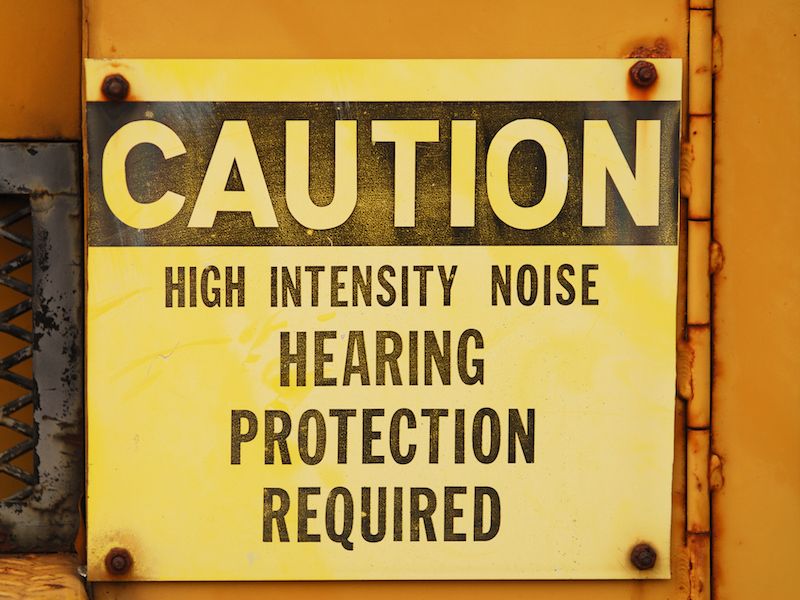
It’s one thing to recognize that you should protect your ears. It’s another matter to know when to safeguard your hearing. It’s harder than, for instance, knowing when you need sunblock. (Are you going outdoors? Is the sun out? You should be using sunscreen.) Even recognizing when you need eye protection is simpler (Working with dangerous chemicals? Doing some building? You need eye protection).
With regards to when to use hearing protection, there seems to be a large grey area which can be dangerous. Unless we have particular knowledge that some activity or place is dangerous we tend to take the easy path which is to avoid the problem entirely.
Risk Assessments
In general, we’re not very good at assessing risk, especially when it comes to something as intangible as lasting hearing problems or loss of hearing. To prove the point, check out some examples:
- Person A attends a very loud rock concert. The concert lasts around 3 hours.
- A landscaping company is run by person B. She spends a significant amount of time mowing lawns, then goes home to a quiet house and reads.
- Person C is an office worker.
You may presume that person A (let’s call her Ann, to be a little less formal) may be in more hearing danger. Ann leaves the performance with ringing ears, and she’ll spend the majority of the next day, struggling to hear herself talk. Presuming Ann’s activity was dangerous to her hearing would be reasonable.
The noise that person B (let’s just call her Betty), is subjected to is not as loud. There’s no ringing in her ears. So her ears must be safer, right? Not really. Because Betty is pushing that mower all day. Actually, the damage accumulates a little at a time even though they don’t ring out. If experienced every day, even moderately loud noises can have a negative affect on your hearing.
Person C (let’s call her Chris) is even less evident. Lawnmowers come with instructions that indicate the risks of persistent exposure to noise. But even though Chris works in a quiet office, she has a very noisy, hour-long commute each day on the train. Additionally, she sits at her desk and listens to music through earbuds. Does she need to think about protection?
When is it Time to Start Thinking About Protecting Your Hearing?
Generally speaking, you need to turn the volume down if you have to shout to be heard. And if your environment is that noisy, you should think about using earplugs or earmuffs.
The cutoff needs to be 85dB if you want to be clinical. Noises above 85dB have the potential, over time, to cause damage, so in those circumstances, you should consider using hearing protection.
Most hearing specialists advise getting a special app to monitor noise levels so you will be cognizant of when the 85dB has been reached. These apps can let you know when the surrounding noise is nearing a harmful level, and you can take suitable steps.
A Few Examples
Your phone may not be with you anywhere you go even if you do download the app. So we may establish a good standard with a couple of examples of when to protect our hearing. Here we go:
- Every day Chores: We already talked about how something as basic as mowing the lawn, when done frequently, can necessitate hearing protection. Cutting the grass is a good illustration of the type of household task that may cause harm to your hearing but that you most likely don’t think about all that often.
- Listening to music with earbuds. OK, this doesn’t call for protection but does require caution. Whether your music is playing directly into your ears, how loud it’s playing, and how long you’re listening to it are all things you need to give consideration to. Consider using headphones that cancel out outside sound so you don’t have to turn up the sound to dangerous levels.
- Operating Power Tools: You recognize that working all day at your factory job will necessitate hearing protection. But what if you’re just working in your garage all day? Most hearing professionals will suggest you use hearing protection when working with power tools, even if it’s only on a hobbyist basis.
- Commuting and Driving: Do you drive for Lyft or Uber? Or perhaps you’re just hanging around downtown for work or boarding the subway. The noise of living in the city is bad enough for your hearing, not to mention the extra injury caused by turning up your tunes to drown out the city noise.
- Exercise: You know your morning spin class? Or even your evening workout session? All of these cases might require hearing protection. The loud volume from trainers who use loud music and microphones for motivation, though it may be good for your heart rate, can be bad for your ears.
These illustrations might give you a good baseline. If there is any doubt, however, use protection. In the majority of cases, it’s better to over-protect your ears than to leave them exposed to possible damage down the road. Protect today, hear tomorrow.